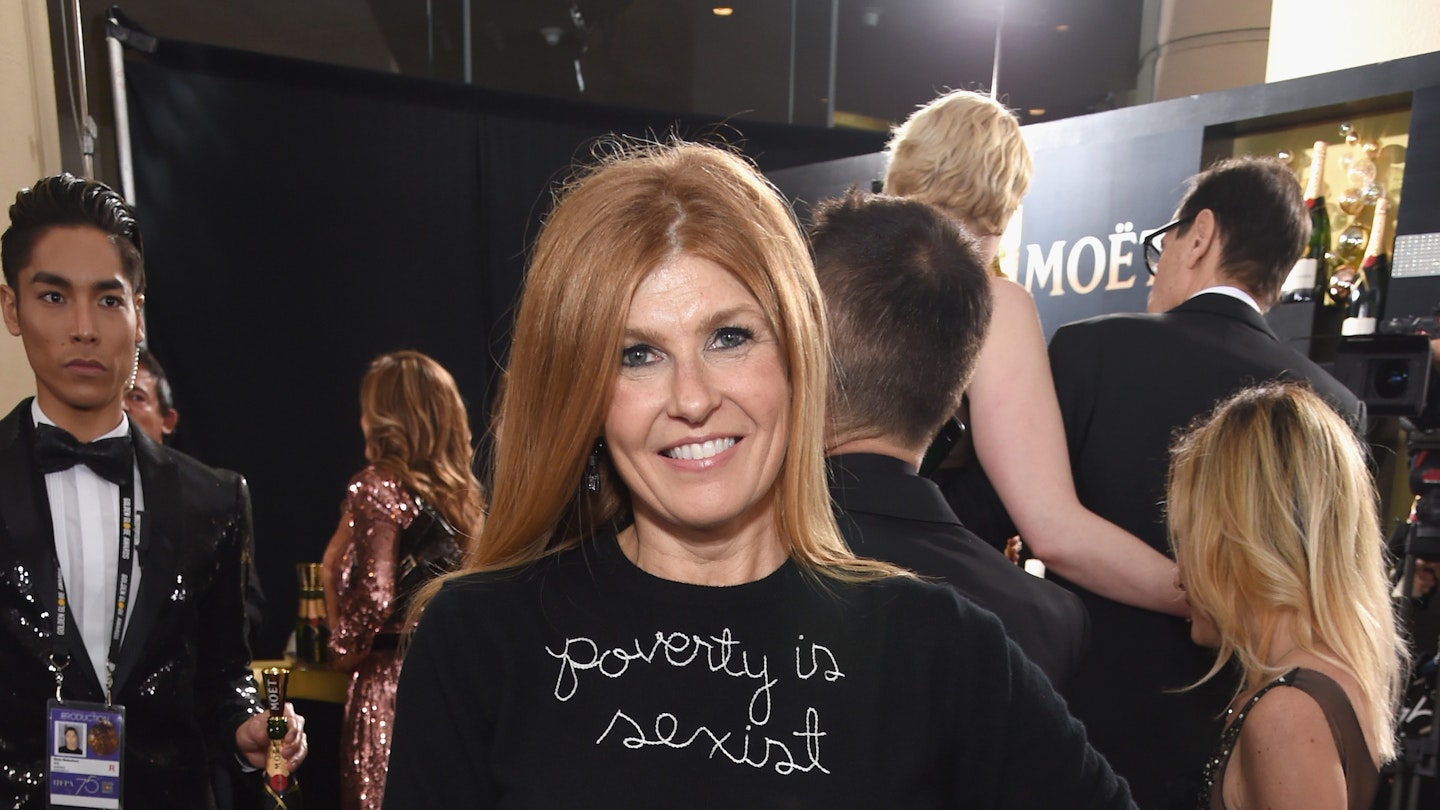Last weekend’s Golden Globes saw a whole host of political statements thanks to certain celebs bringing along their activist friends. From helping victims of Hurricane Maria to advocating Native Treaty Rights, everyone was trying to have their voice heard. Connie Briton, however, chose to have her message seen not heard. The slogan ‘poverty is sexist’ embroidered on her t-shirt caused quite the stir on Twitter, with a wave of questions about how, in fact, gender is relevant to poverty.
So, for all of those who were genuinely perplexed by the statement, and those who need to explain it succinctly to the token meninist in their life, we’re here to answer that very question.
Firstly, it’s imperative to note that the statements being made at the Golden Globes weren’t limited to the US or UK, they are relevant to the entire world. While the UK does have more women living in poverty than men, the gap is miniscule compared to the gap in lower income countries. That doesn’t mean we should ignore the issue though, since poverty in general is obviously worse outside the UK, but we still care about that (I bloody hope).
Why is poverty sexist?
In simple terms, poverty is sexist because just like every bloody other injustice in the world, there is a gender gap. Women are more likely to live in poverty than men, the UK included. Due to the restrictions women face not just through societal expectations (like working in lower income fields and taking the burden of child care) but actual institutional restrictions (like gender pay gaps and glass ceilings), we’re more likely to live in low-income households -especially if we’re single. According to Trust for London, 55% of all London’s low paid jobs are held by women. In the entire UK, around 5.1million women live in poverty in the UK, compared to 4.4million men, according to figures released by JRF for the BBC's 100 Women series.
Statistics from the Office for National Statistics show that women are more likely to hold jobs that pay less than the minimum wage than men.
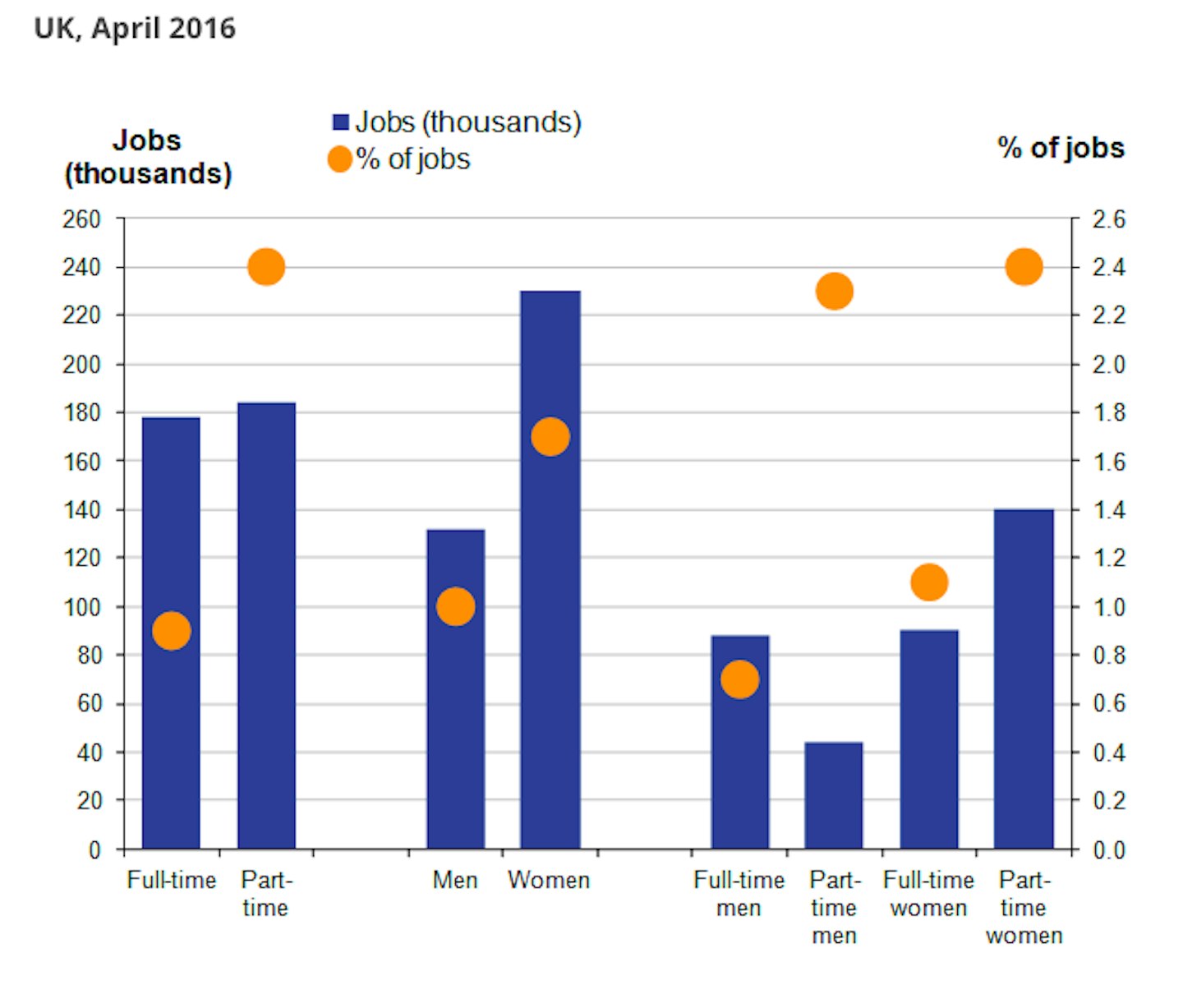
While this is largely due to the fact that more women hold part time jobs than full time compared to men, there is also the question of why this is the case. One reason for this is societal expectations, as women are expected to take more time off after giving birth. However, it is also due to the fact that there is only one majority female industry, of the seven that exist, that is in the top seven industries for employing full-time workers, according to The Guardian.
Essentially, the opportunities for women to work full time are less than men, as is the case for general opportunities globally. Romilly Greenhill, the UK Director of ONE which campaigns against gender inequality states that:
‘Nowhere on earth do women have the same opportunities as men, what we’ve found that in the poorest countries its far worse. Poverty is sexist because women and girls are less likely to get an education, they’re at greater risk of disease and of poor health.'
Comparing the UK statistics globally, they look insignificant, with girls in poorer countries unable to even access education and forced into early marriage and childbirth.
Why do we women have less opportunities than men?
While in the UK it’s largely due to women bearing a larger burden of childcare, dealing with the gender pay gap and being restricted opportunities after a certain point in one’s career (aka the glass ceiling), globally it’s a lot to do with education. According to Romilly, '130 million girls are not in school right now. Thats 130 million who can’t become empowered young women or contribute to their societies.'
There are 20 prominent nations around the world that deny girls the access to education, including India, Egypt and Pakistan. Whether its household duties, early marriage or early childbirth, there is a greater burden on girls in poorer countries to remain out of education.
In the UK, the issue is less to do with avoiding conflict and disease and more to do with societal norms. Women are less likely to enter into high-income industries, such as STEM and investing, because they are steered away from mathematical and scientific subjects. In 2012, the OECD found that only in Jordan, Qatar and the United Arab Emirates do girls feel more comfortable with math than boys.
Basically, women have less opportunities because they are told they can’t pursue opportunities that would afford them a better standard of living. In the UK, it’s subliminal, implied and socialized by gendered behavioural expectation. In the world’s poorest countries, it’s explicit, direct and punishable. For British women, we can grow and learn how to move beyond gender boundaries and pursue new endeavors, however, in doing so we are still more likely to be paid less and eventually hit a ceiling. For women in low-income countries, they are subject to gender expectations their entire life, and in attempting to move past them could risk their life- as did Malala Yousafzai in 2012.
So yes, Connie Briton was right. Poverty IS sexist. Poverty also discriminates against race, disability and sexuality. To put it plainly, all social injustice is nuanced by gender, race and beyond- it would be naïve to assume otherwise. So, to answer your question ‘is poverty sexist?’… of course it bloody is.
How can we stop poverty being sexist?
ONE works towards gender equality globally but is currently running a campaign to get girls into education. They’re asking the public to campaign for the UK to support global education with a $500 million pledge at the next Global Partnership for Education Financing Conference in Dakar in February. World leaders will meet to discuss how to fund education. You can take action and find out more about their campaign here.
Check out all of the activists who attended the Golden Globes 2018...
Debrief Activists on Golden Globes red carpet
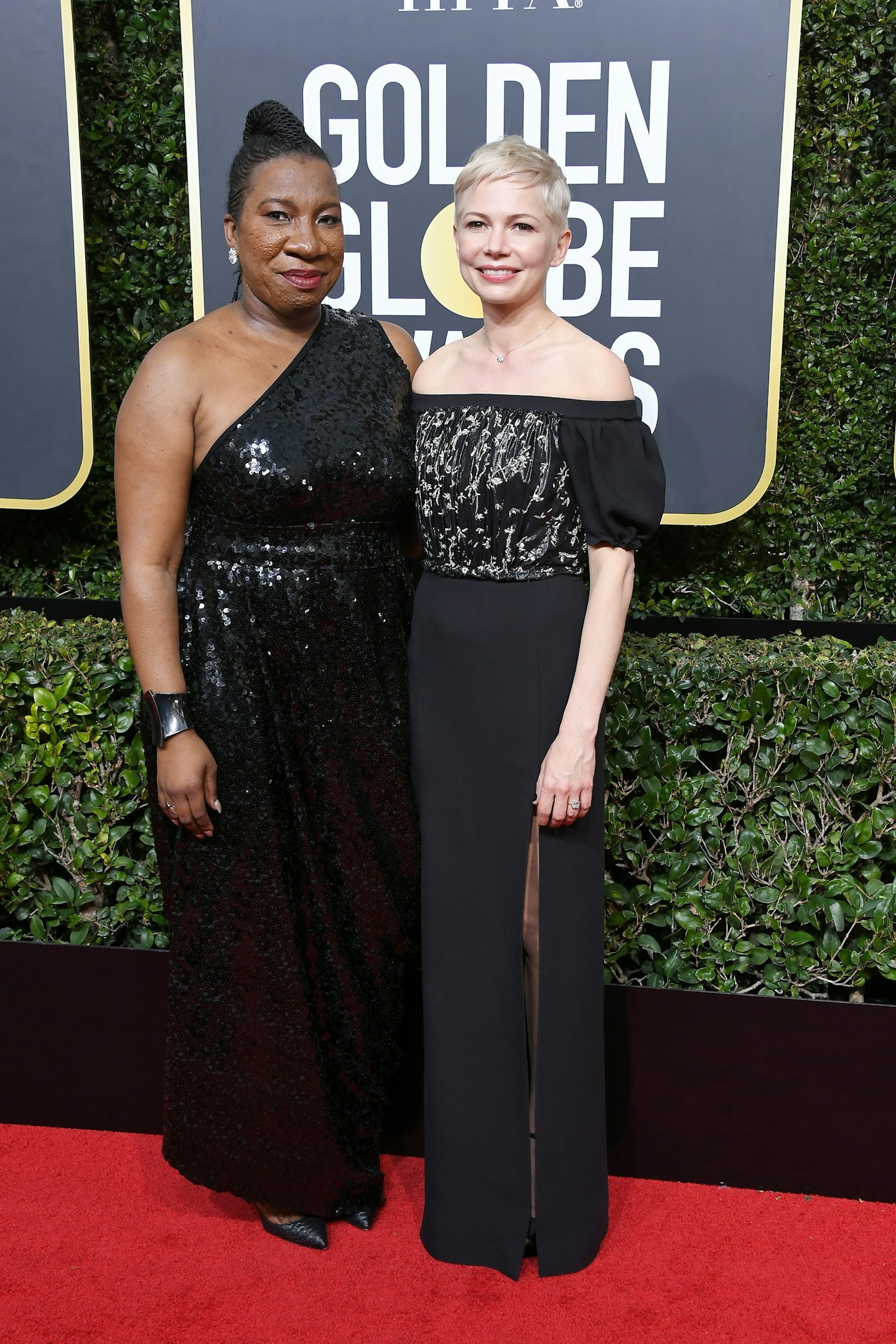 1 of 8
1 of 8Tarana Burke
A civil rights activist who started #MeToo in 2006, Tarana attended with Michelle Williams. On how the #MeToo movement has grown, she said:'It's deeply humbling, this is something I started out of necessity, something that I thought my community needed and its grown over the years but I never could've envisioned it growing like this. This moment is so powerful because we're staring at a standing at a collaboration between these two worlds that people don't usually put together and would most likely have us pinned against each other.'
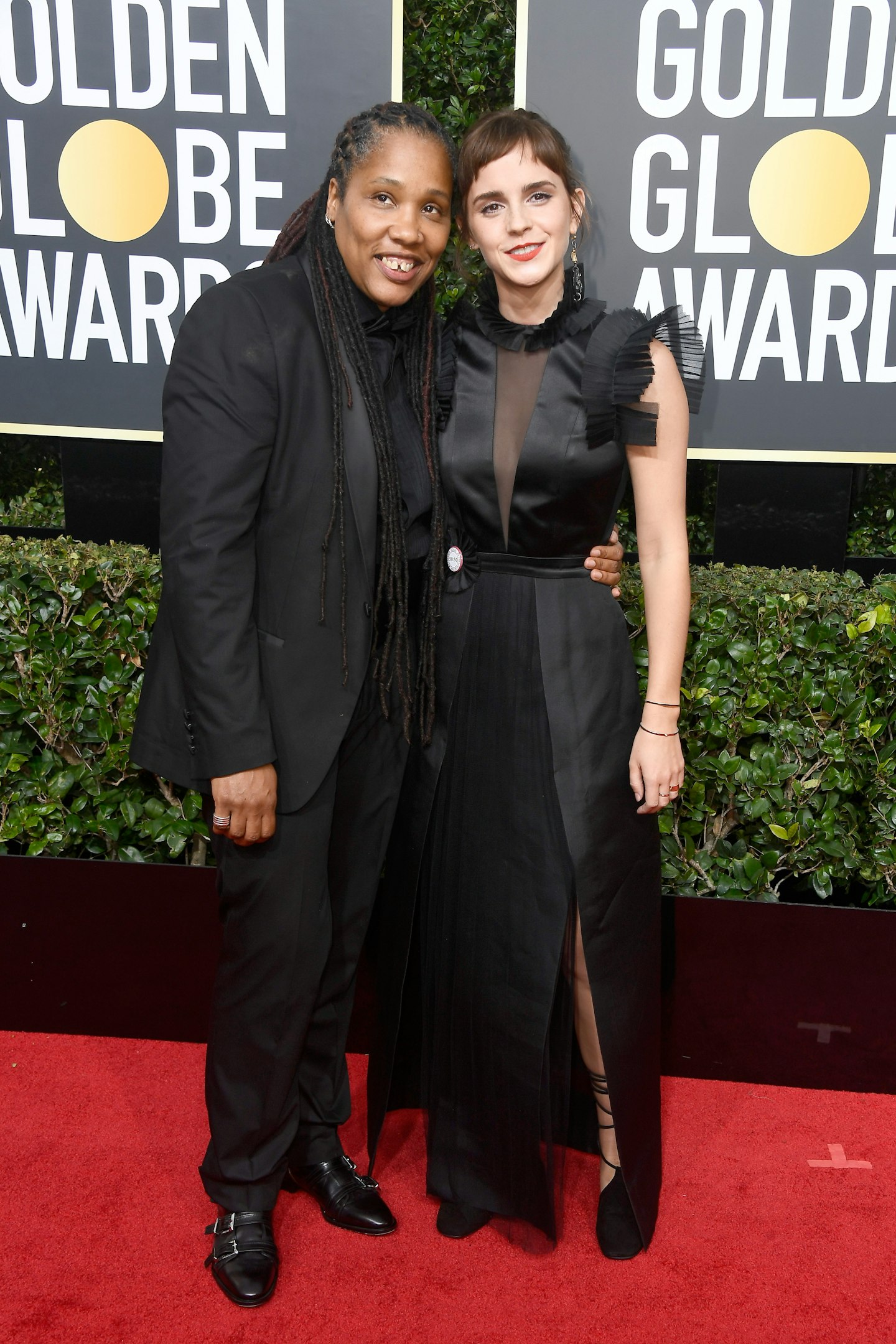 2 of 8
2 of 8Marai Larasi
Director of Imkaan – an organization that fights violence against BME women - Marai attended with Emma Watson. On using the platform to highlight injustice, she said:'There's something about women in Hollywood speaking out, there is a wall of silence around violence against women and girls and every time someone speaks out it just creates a bit of a crack in that wall. We don't want to create hierarchies were we're saying women in Hollywood are more important than other women but were saying women in Hollywood have an opportunity to amplify the issues and to shine a light on things and actually that's incredibly important. It's a special moment in time, it's not the beginning of the struggle or end of the struggle but it is a critical moment so this is a fantastic platform and were trying to use it in the best way we possibly can.'
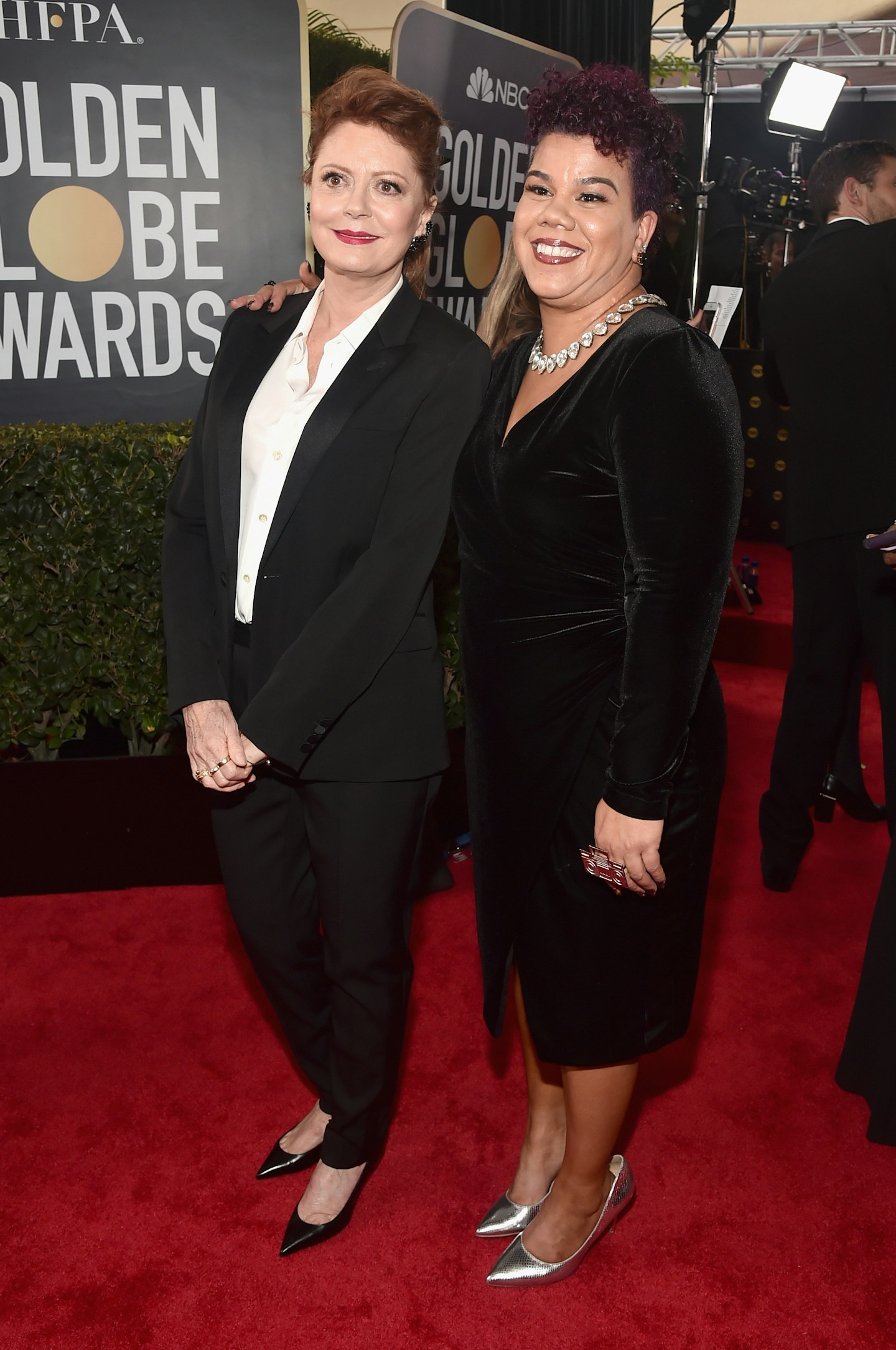 3 of 8
3 of 8Rosa Clemente
A Puerto Rican hip-hop activist and independent journalist, Rosa was vice presidential running mate of the Green Party to presidential candidate Cynthia McKinney in the 2008 US Presidential election. On her current project, she said:'My project Puerto Rico on the Map we just want to let people know that to this day half of the people on the island are still without power, 90% don't have access to clean water and women have stopped lactating because they don't have proper nutrition this is 3.5 million American citizens that this government has neglected almost 110 days after Hurricane Maria hit. Right now, I feel I'm speaking for the people of Puerto Rico that cannot turn on a TV.' On the need for men to join the movement: 'Our sisterhood is strong, it's always been strong, now we need men to be allies and accomplices in smashing sexual violence. It can't just be because you have a daughter or a mother, it has to be because we are human beings that deserve the right to dignity whether we're working on a Hollywood set or at Kentucky fried chicken, whether we're a mother in south Bronx or a mother in Beverly Hills.'Why was it only women doing all the emotional labour at the Golden Globes? We asked that very question.On the TIME'S UP Legal Defense Fund: 'We need that because many women don't have money, we live in a society that is economically unfair to most people. What do you do if you are working two jobs and your sexually harassed all day, do you quit your job or do you feed your child? Do you quit your job or do you pay your rent? So, we need to be supporting women who are the most marginilized but also center them because they are the most powerful.'
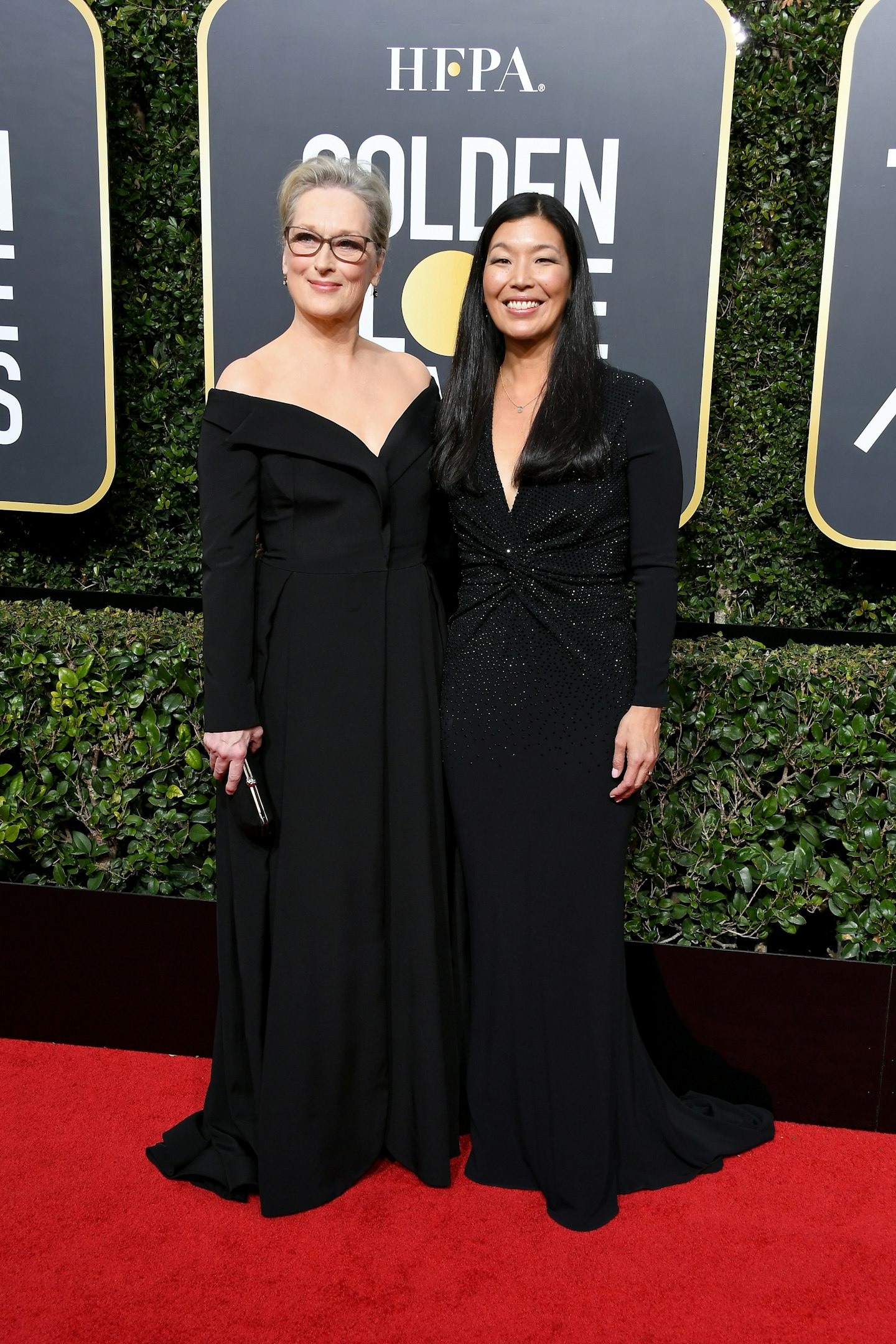 4 of 8
4 of 8Ai-jen Poo
The director of the US National Domestic Workers Alliance, Ai-Jen attended with Meryl Streep. On what they hope to gain from this publicity, she said:'I hope people see the energy and the momentum and the fact that were uniting across all industries and all communities standing together saying we all deserve work places were we're safe and our work is valued and we can live and work with dignity, that's the future. We have momentum and we want to say to everyone that they should join us this is a movement where there's space for everyone and there's a role for everyone.'
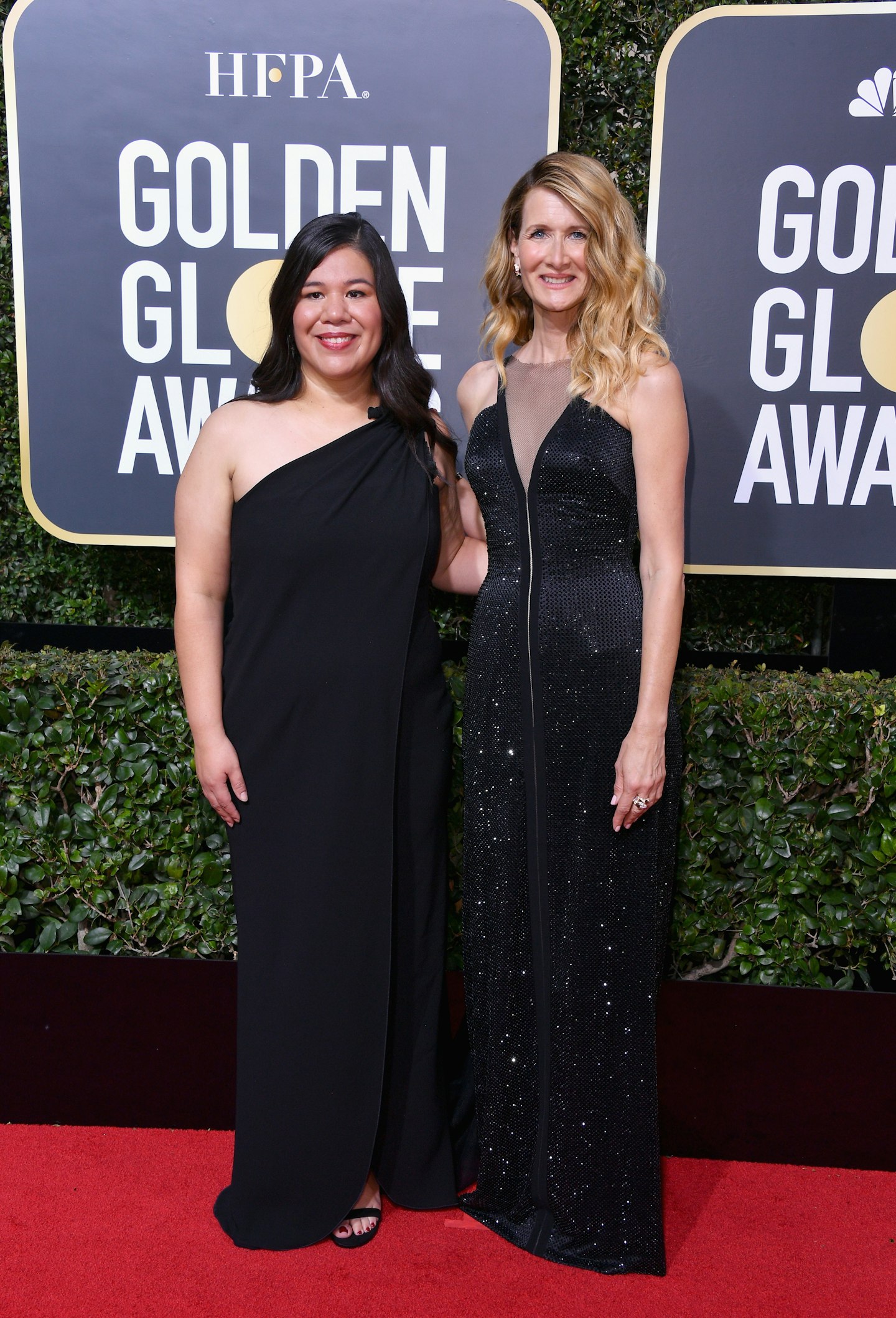 5 of 8
5 of 8Mónica Ramírez
Head of the National Farmworkers Women's Alliance and the author of Time Magazine's letter of solidarity with women of Hollywood, Mónica attended with Laura Dern. On why she decided to write the letter, she said:'Farmworker women pick, pack and plant the food that we eat and have a long history of combatting work place sexual violence. When we learned about what was happening in Hollywood, our women felt very strongly that they wanted to send a message to women in this industry and all people that are experiencing sexual violence in the workplace. That they are not alone, that we stand with them and we lend them our power and our strength as they move through this difficult time. Part of our work as an organization is to fight for gender equality along all lines, so we fight for equal pay, we fight sexual harassment, we fight for equity, so that every person's voice will be valued and every person will have the opportunity to reach their full potential.'She also made this statement via Twitter:'Walking down the red carpet on behalf of my ancestors; my family; the hundreds of thousands of farmworker women in our nation; my community; the many organizers, advocates and lawyers; and all of those who paved the way for this movement.'
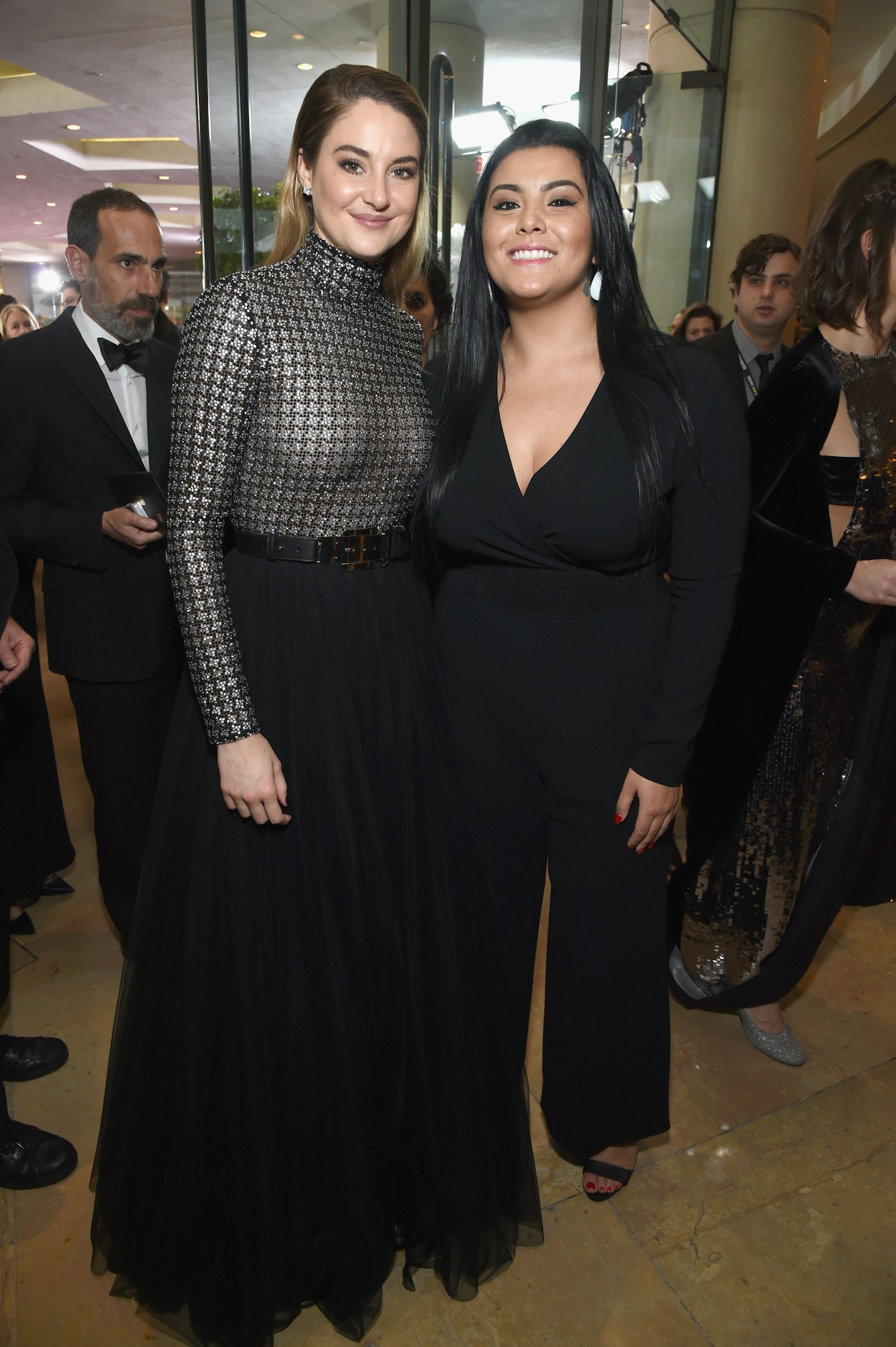 6 of 8
6 of 8Calina Lawrence
An activist and singer who uses themes of racial injustice, police brutality and misrepresentation of Native Americans in the media, Calina attended with Shailene Woodley.While she was not interviewed at the event, her message is prevalent in her music which you can find here. She is a member of the Suquamish Tribe and advocates for Native Treaty Rights, the "Water is Life" movement and the #NoLNG253 campaign led by the Puyallup Tribe. She walked with Shailene in support of solidarity and accountability on the imbalance of power between genders.
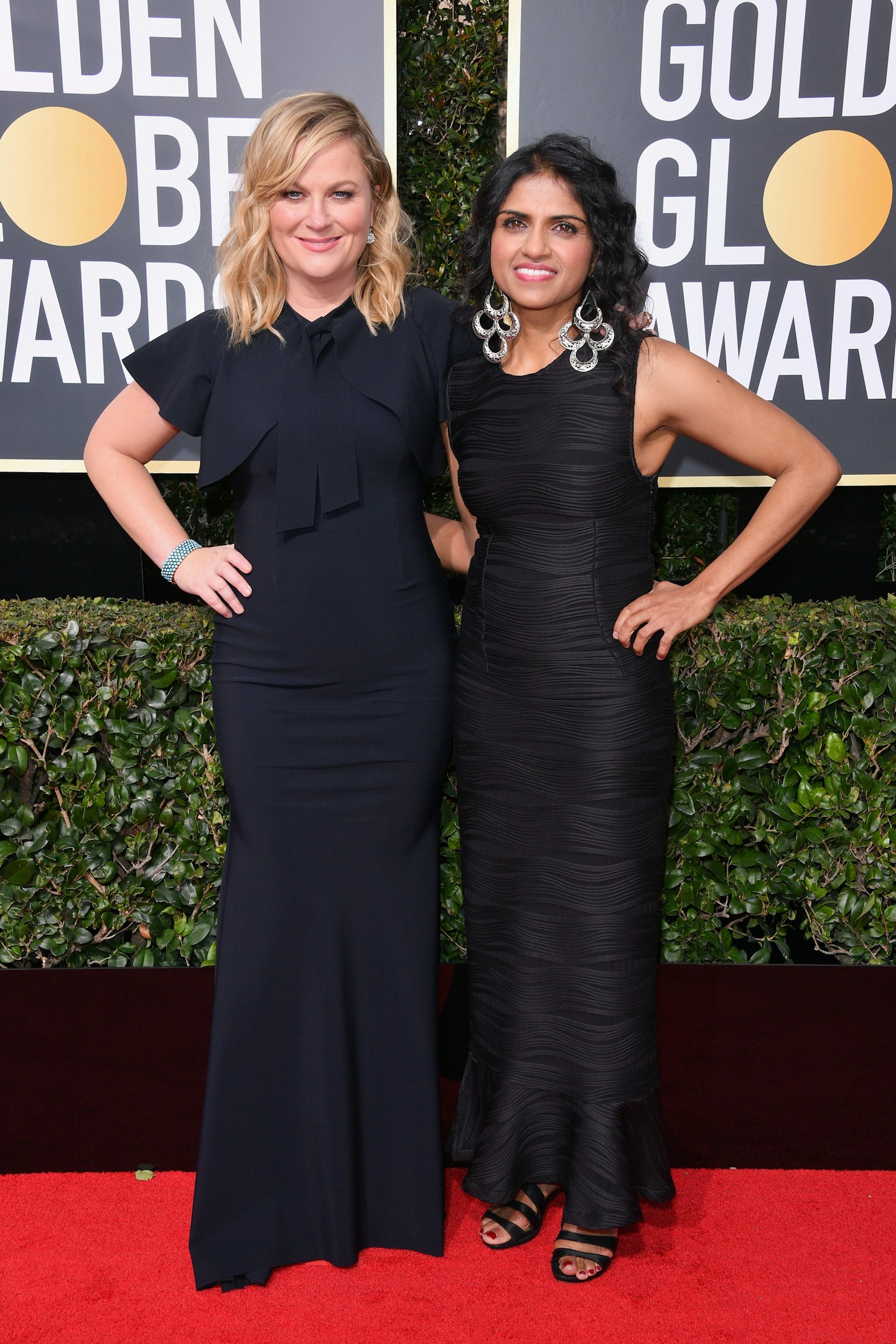 7 of 8
7 of 8Saru Jayaraman
President of Restaurants Opportunities Center United, Saru walked with Amy Peohler. Not only is she a lawyer and social justice activist, she has written two books, The New Urban Immigrant Workforce and Behind the Kitchen Door: The People Who Make and Serve Your Food. She stated:'I am here tonight in honor of the women servers, bussers, bartenders, runners, cooks, and hosts who experience the highest rates of sexual harassment of any industry in the country. Tipped workers in our industry earn a federal minimum wage of just $2.13 an hour from their employers, and must tolerate extreme harassment from customers in order to earn enough in tips to feed their families. Managers encourage these women to subject themselves to objectification in order to make more money in tips, and this makes them vulnerable to co-worker and manager harassment as well.'On why the theme for the night was black? She said, 'black is the most powerful color. Black is power. Women are powerful.'
 8 of 8
8 of 8Billie Jean King
A tennis legend who founded Billie Jean King Leadership Initiative, the Women's Sports Foundation and the Women's Tennis Association, she attended with Emma Stone. On what she hopes will come from the event, she said:'We're in solidarity standing up for people who've been abused and harassed. The industry is all together on this, I hope everybody will go to timesupnow.com and look at all the different group. We met with the activists yesterday from all the different organizations, it's amazing what they're doing and how they've invested in these people and to give everyone power. So, I hope everyone goes to the website and looks.'
Click play to find out why young women in Derby don't vote...
Liked this? You might also be interested in...
This article originally appeared on The Debrief.
